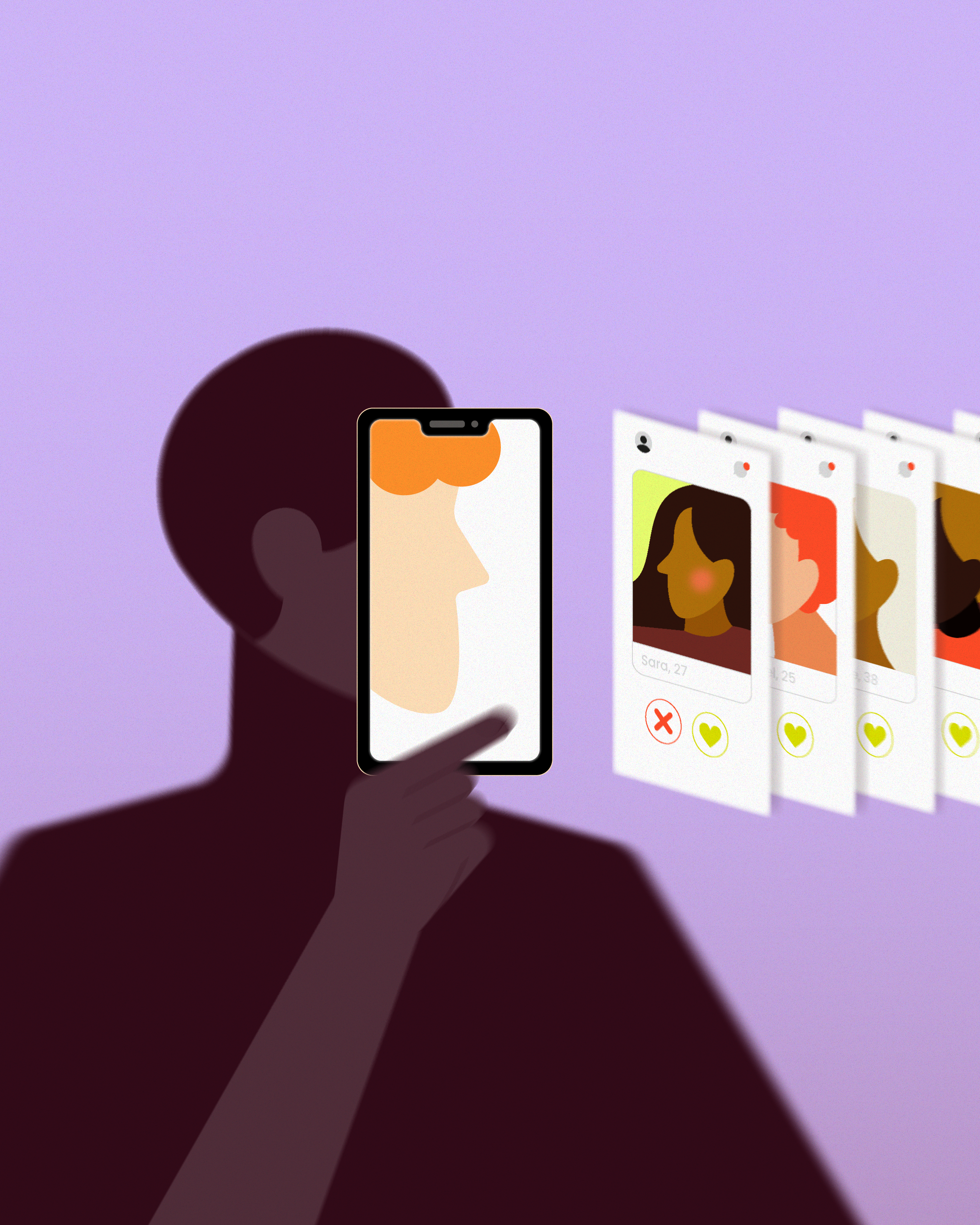Your cart is currently empty!

When your match is a virtual dating assistant
Summary
More and more people are entrusting the management of their dating apps to virtual dating assistants in the hope of being more successful in the dating game. One of our collaborators talked with two people who have already managed the apps of someone in their circle.
On paper—or rather, on screen—your date appears to be completely normal. That is, they did until, between sips, your new match tells you that they have been working with a virtual dating assistant. Surprise! That was the person you were chatting with on the dating app a few days earlier, not your actual match.
What may seem absurd and raise many ethical questions, such as “Is it okay to pretend to be someone else?”, is nevertheless a real practice. Several organizations and individuals now offer their services to people who are looking for moments of love or intimacy but don’t necessarily have the time, the skills or the capacity to spend hours swiping.
In this Vice article, Scott Valdez, CEO of VIDA, explains that, although he recognizes that his company works within an “ethical gray area,” he’s convinced that its services do more good than harm. In a sense, if the demand is this high, he can’t be entirely wrong. You just need to type the keywords “virtual dating assistant” into any search engine to realize that there are a host of them with endless specializations.
Is using a dating assistant any worse than lying on your profile? That’s the question I asked myself after seeing a study conducted by the Pew Research Center which found that nearly 7 out of 10 people who have used dating apps in 2019 think it’s very common for people to lie to boost their desirability. I’ll let you draw your own conclusions from that.
Okay, but what do virtual dating assistants actually do?
Generally speaking, dating assistants—or matchmaking assistants—manage their clients’ dating profiles and maintain virtual relationships while respecting the parameters they were given. These specialists can create profiles, sort matches, send messages, and maintain online conversations before proposing dates to the suitors who are interested in their client.
Most of the time, people who use this type of service always have access to their dating profiles and communicate with their assistant before moving on to the next step, an actual date. But this way of working can obviously vary from one case to another.
Why use matchmaking services?
In the same Vice article, Valdez emphasizes that his clientele is mainly made up of men who lack the time to invest in dating applications or who quite simply don’t have much dating success otherwise. However, this is far from being his only clientele.
If we start from the idea that dating applications are not accessible to everyone, we soon understand that many people would benefit from a helping hand in navigating them. These people include neurodivergent individuals and those who are simply unfamiliar with digital technology (let’s not forget that it hasn’t been around for thaaaat long!).
In fact, these reasons were what drove Jérémy* to ask Renaud* to manage his apps and encouraged Paola* to lend her mother a hand so that she could find love in the digital world, a world in which she had never set foot… or finger.
Managing the dating apps of someone in your circle
Renaud has been managing Jérémy’s dating apps for almost two years. He devotes about twenty minutes a day to them in exchange for a small salary.
Jérémy, who has Asperger’s syndrome, has always found it difficult to connect with people via dating apps.
He asked Renaud to manage his apps with the aim of meeting women with whom to share sweet moments commonly referred to as one night stands.
“At first I refused. I didn’t agree with the idea of posing as someone else,” explains Renaud. He changed his mind when Jérémy explained to him that he was already dealing with a company to navigate the world of applications, but that he now preferred to pay someone he knew personally.
As for Paola, she was the one who offered to take the reins of her mother’s Tinder account, for free. Her mother, who hadn’t met a man since divorcing Paola’s father, accepted her proposal somewhat reluctantly. “I started by making her a Tinder profile and showing her how it worked,” says Paola. “From there, she managed her own matches.”
However, because Paola’s mother had never texted in her life, she soon realized that several subtleties of digital language eluded her. She quickly grew tired of dating apps, and Paola thus offered to manage her Tinder for her.
“My mother didn’t have a lot of self-esteem at the time, and she tended to project that onto the messages she received. But when I read these messages, I didn’t see the same thing as her at all.” With a little time, Paola’s mother eased into the game.
Breaking the ice before the first date
Renaud’s and Paola’s roles evolved naturally. They consist (or consisted) of swiping people’s profiles, starting conversations, and moving on to the next step, that is, proposing a first date.
“It’s super important to me that Jérémy’s relationships are real. I just like and send a few messages early on,” explains Renaud. He estimates that he has interacted with about 100 women and that he sends between two and three profiles to Jérémy per week. In other words, he plays the role of matchmaker, albeit with one key difference: the people he talks with think they are talking with Jérémy.
As for Paola, she knows her mother so well that the conversations she had with her mother’s matches were very faithful to what they would have been had her mother been the one typing. On a few occasions, Paola also booked first dates with her mother’s agreement.
“My mother was happy. We even went shopping to buy her new clothes, but she always ended up flaking out on her dates. I think my mother just wasn’t ready after all.”
Paola’s mother has since decided to take a break from dating apps, but she isn’t ruling out the idea of eventually using them again.
Swiping to give a helping thumb
Jérémy knows that he has trouble connecting with others, which is the very reason he pays Renaud to take care of his dating applications. Paola’s mother is a bubbly woman who talks to everyone and finds it easy to form new connections with the people she meets. It’s just that she can’t translate all of it into writing.
It was to help Jérémy have a fulfilling sex/intimate life that Renaud accepted the role of middleman. For her part, Paola wanted to help her mother “get back on the market” even though she had no idea how dating apps worked. Although their stories differ from one another, the two people who adopted, in a way, the role of matchmaking assistant, agree on one thing: they wouldn’t have done it for anyone else.
*To preserve the anonymity of the four concerned parties, their names and any identifying information, have been modified.
-
Acra, N. C., Halston, A., Chun, H. et Allen, J. (2021). Understanding deception tactics with the utilization of dating applications. Education, Language and Sociology Research, 2(2), 33–49. https://.doi.org/10.22158/elsr.v2n2p33
Amati, V., Meggiolaro, S., Rivellini, G. et Zaccarin, S. (2018). Social relations and life satisfaction: The role of friends. Genus, 74(7), 1–18. https://doi.org/10.1186/s41118-018-0032-z
Bandinelli, C. et Gandini, A. (2022). Dating apps: The uncertainty of marketised love. Cultural Sociology, 16(3), 423–441. https://doi.org/10.1177/17499755211051559
Bleize, D. N. M., van Stekelenburg, A. et Tamboer, S. L. (2023). The association between mobile dating app use and relationship status satisfaction: A survey study. Mobile Media & Communication. https://doi.org/10.1177/20501579231221069
Chapman, R. et Botha, M. (2023). Neurodivergence‐informed therapy. Developmental Medicine & Child Neurology, 65(3), 310–317. https://doi.org/10.1111/dmcn.15384
Mirkovic, B. et Gérardin, P. (2019). Asperger’s syndrome: What to consider?. L’encephale, 45(2), 169–174. https://doi.org/10.1016/j.encep.2018.11.005
Miron, M., Goulet, K., Auger, L.-P., Robillard, C., Dumas, C., Rochon, F. et Kairy, D. (2023). Online dating for people with disabilities: A scoping review. Sexuality and Disability, 41(1), 31–61. https://doi.org/10.1007/s11195-022-09771-x
Mogavero, M. C. et Hsu, K. H. (2020). Dating and courtship behaviors among those with autism spectrum disorder. Sexuality and Disability, 38(2), 355–364. https://doi.org/10.1007/s11195-019-09565-8
Peng, K., Lin, W. Y. et Chen, H. (2022). Consequences of deceptive self-presentation in online dating. Chinese Journal of Communication, 15(4), 582–610. https://doi.org/10.1080/17544750.2022.2052130
Rochadiat, A. M., Tong, S. T., Hancock, J. T. et Stuart-Ulin, C. R. (2020). The outsourcing of online dating: Investigating the lived experiences of online dating assistants working in the contemporary gig economy. Social Media + Society, 6(3). https://doi.org/10.1177/2056305120957290
Schroeder, J. et Fishbach, A. (2024). Feeling known predicts relationship satisfaction. Journal of Experimental Social Psychology, 111, 1-15. https://doi.org/10.1016/j.jesp.2023.104559
Vera Cruz, G., Aboujaoude, E., Rochat, L., Bianchi-Demichelli, F. et Khazaal, Y. (2023). Finding intimacy online: A machine learning analysis of predictors of success. Cyberpsychology, Behavior, and Social Networking, 26(8), 604–612. https://doi.org/10.1089/cyber.2022.0367






